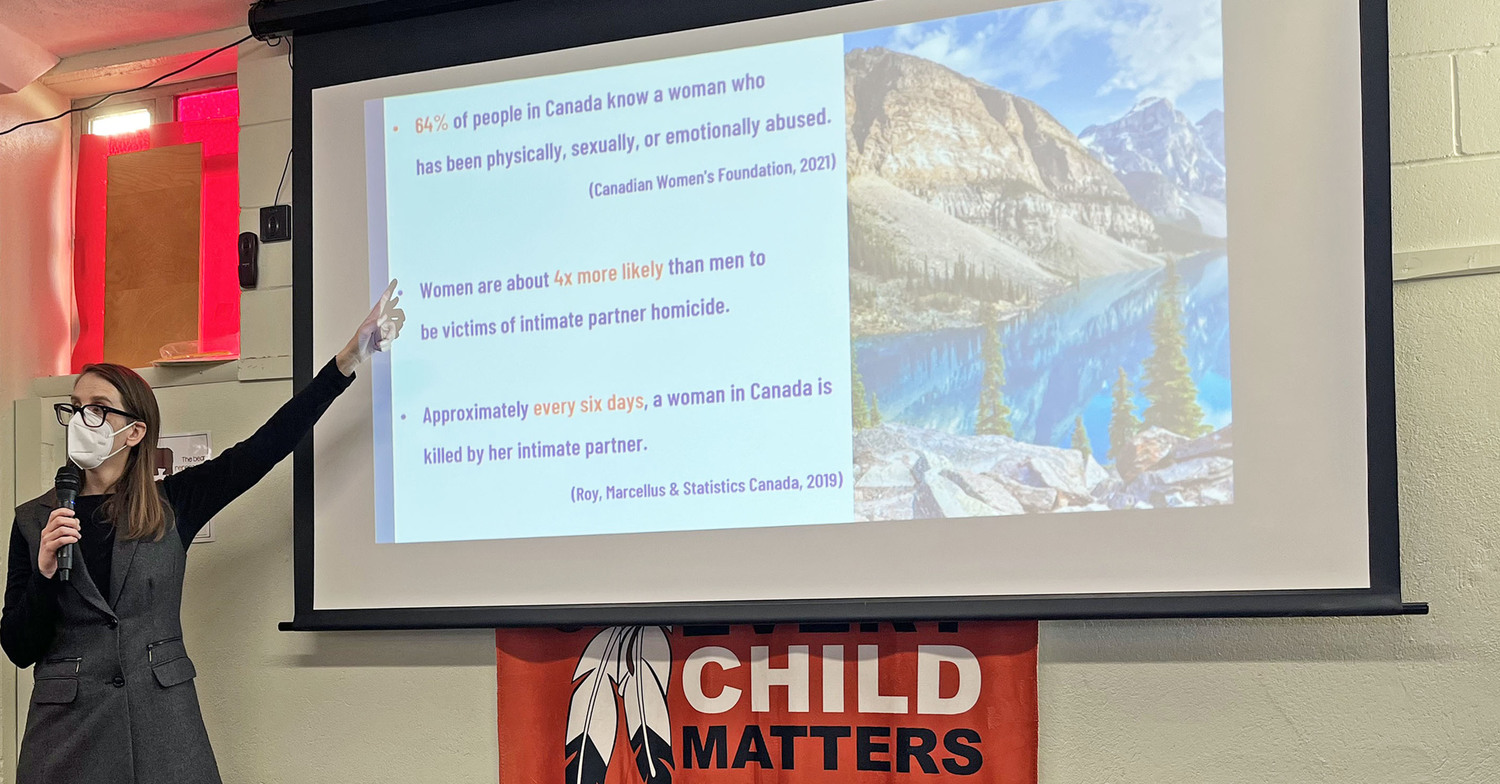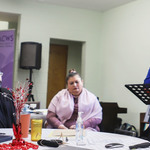If you suspect someone you know is in a violent relationship, asking if they are okay and if they feel safe at home can help save their life.
At the "Stepping. Outside. The. Shadow." workshop organised by the Immanuel ACW in Wetaskiwin on February 11, church and community members from Wetaskiwin, Maskwacis, Camrose, Ponoka, Edmonton and surrounding areas heard about the responsibility we all have to end domestic violence and support survivors and their families.
Because victims of domestic violence are often isolated from their friends and family support network (the COVID pandemic exacerbated this isolation), their workplace peers and/or church community are often their only lines to safety.
Fiona Brownlee, a member of the Immanuel ACW planning committee, said when her close family member was trapped in an abusive relationship, her managers at work noticed she was receiving an unusual number of phone calls and texts from her spouse. They gently asked her if she needed counselling and she accepted. With support, she was eventually able to step out of the shadow of abuse.
Presenting at the workshop virtually via Zoom from her home in B.C., Helga Edwards, co-author of Addressing Domestic Violence in the Church, said church members can support someone who has suffered domestic violence by acknowledging their pain and grief. People often feel alone and forgotten, so it is helpful for them to know our faith offers hope, she said. “A victim's faith and the support of their church community can be vital to their healing process.” With her husband Bob Edwards, Helga empowers victims through the Awake Deborah ministry (awakedeborah.com).
Jill Shillabeer, Leading Change call to action coordinator for the Alberta Council of Women’s Shelters (ACWS) and Joe Campbell, Leading Change community developer, gave an engaging presentation on domestic violence in Alberta.
Domestic violence and abuse happen to people of all genders, however, those who identify as women, girls and gender minorities are at an increased risk of experiencing gender-based violence, more severe forms of gender-based violence and longer-lasting psychological and socioeconomic impacts of violence, they said. From April 2021 to March 2022, 98.5 per cent of the individuals sheltered by the ACWS identified as women. (ACWS 2022 Data Release)
Located in Edmonton on Treaty Six land, the ACWS office represents a network of 50 women’s shelters on Treaty 4, 6, 7, and 8 lands and the six Métis regions across the province. During the past year, these shelters received more than 65,000 calls.
Two shelters, in Edmonton and Calgary, are dedicated to serving seniors. Older adults are particularly vulnerable as they can experience intimate partner abuse, but also abuse from adult children, grandchildren, or other family members, and an increasing number are experiencing abuse and harm from roommates. Other vulnerable populations include Indigenous women, newcomers to Canada facing language and socio-economic barriers and people who identify as LGBTQ2S+. (ACWS 2022 Data Release)
Gloria Rogers, a member of Immanuel’s parish reconciliation team and ACW, shared a Moss Bag Teaching, explaining that traditionally a moss bag representing a mother’s womb was gifted to a Cree mother, enabling her to take her baby everywhere she went. Rogers held a Moss Bag she made for her daughter to show the traditional practice of sewing an eyelet for each of the Seven Teachings of Love, Respect, Courage, Honesty, Wisdom, Humility and Truth, gifts of the Eagle, Buffalo, Bear, Sabe (Sasquatch), Beaver, and Wolf.
Nora-Lee Rear, executive director of the Camrose Women’s Shelter, which serves an area of central and eastern Alberta extending to the Saskatchewan border, invited questions from workshop participants. She was joined by Shillabeer and Campbell for a panel discussion.
This was the second workshop on domestic violence offered by the Immanuel ACW, which has been active in the Wetaskiwin community for more than 100 years. The Stepping. Outside. The. Shadow. workshop was financially supported by the Wetaskiwin Family and Community Support Services (FCSS). Proceeds from ticket sales for the event were donated to women’s shelters in Camrose and Ermineskin.
Through its Leading Change prevention program, ACWS offers tailored gender-based violence prevention training to workplaces, schools, and communities. To learn more, visit https://acws.ca/
If you are a victim of domestic violence, you can call the Alberta Council of Women’s Shelters toll-free at 1-866-331-3933 to speak to someone at a shelter near you. If you are in immediate danger, call 911. The Camrose Women’s Shelter also has a 24/7 support line: 1-877-672-1010.
Watch the April issue of The Messenger for the full story.







































